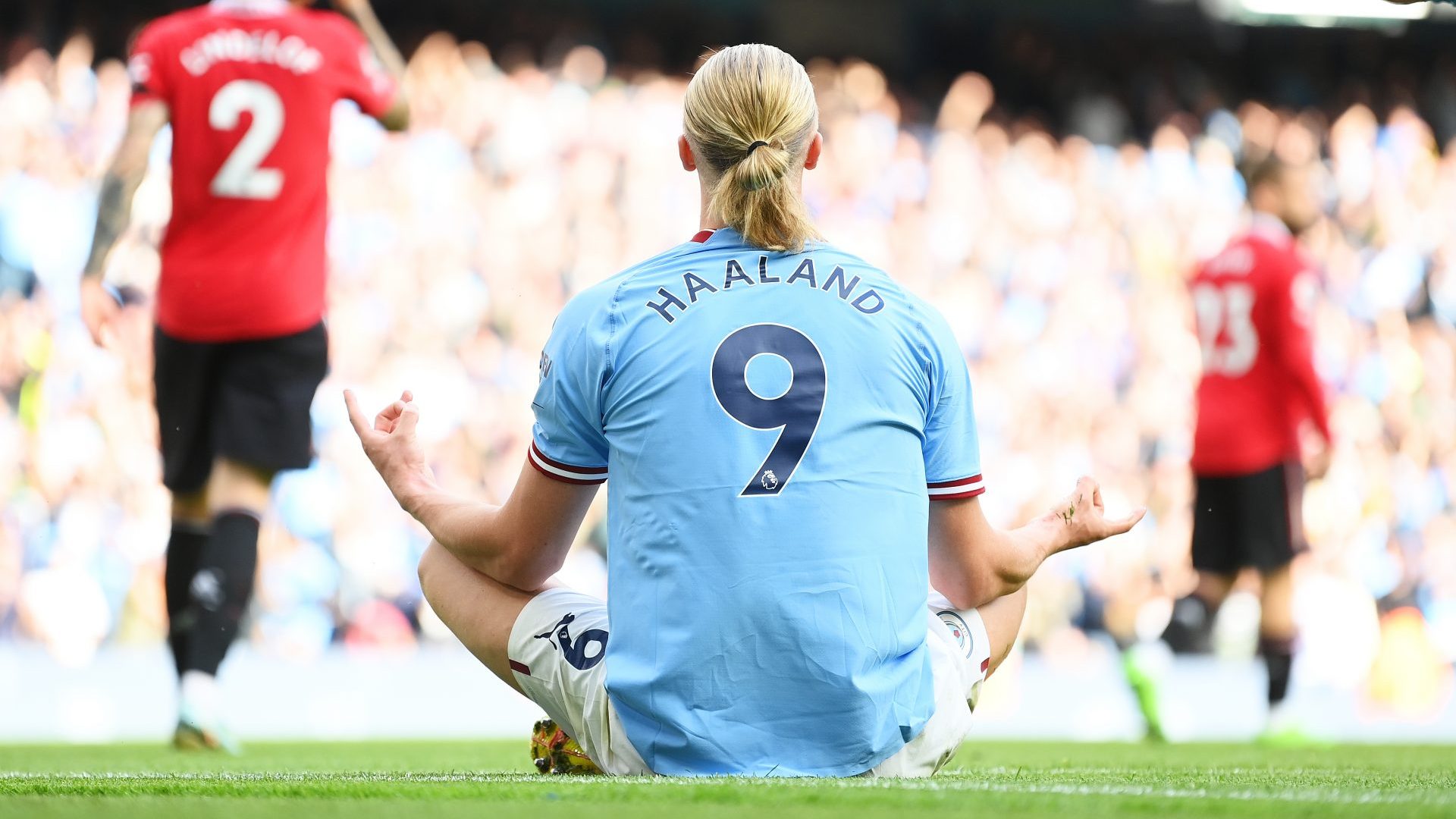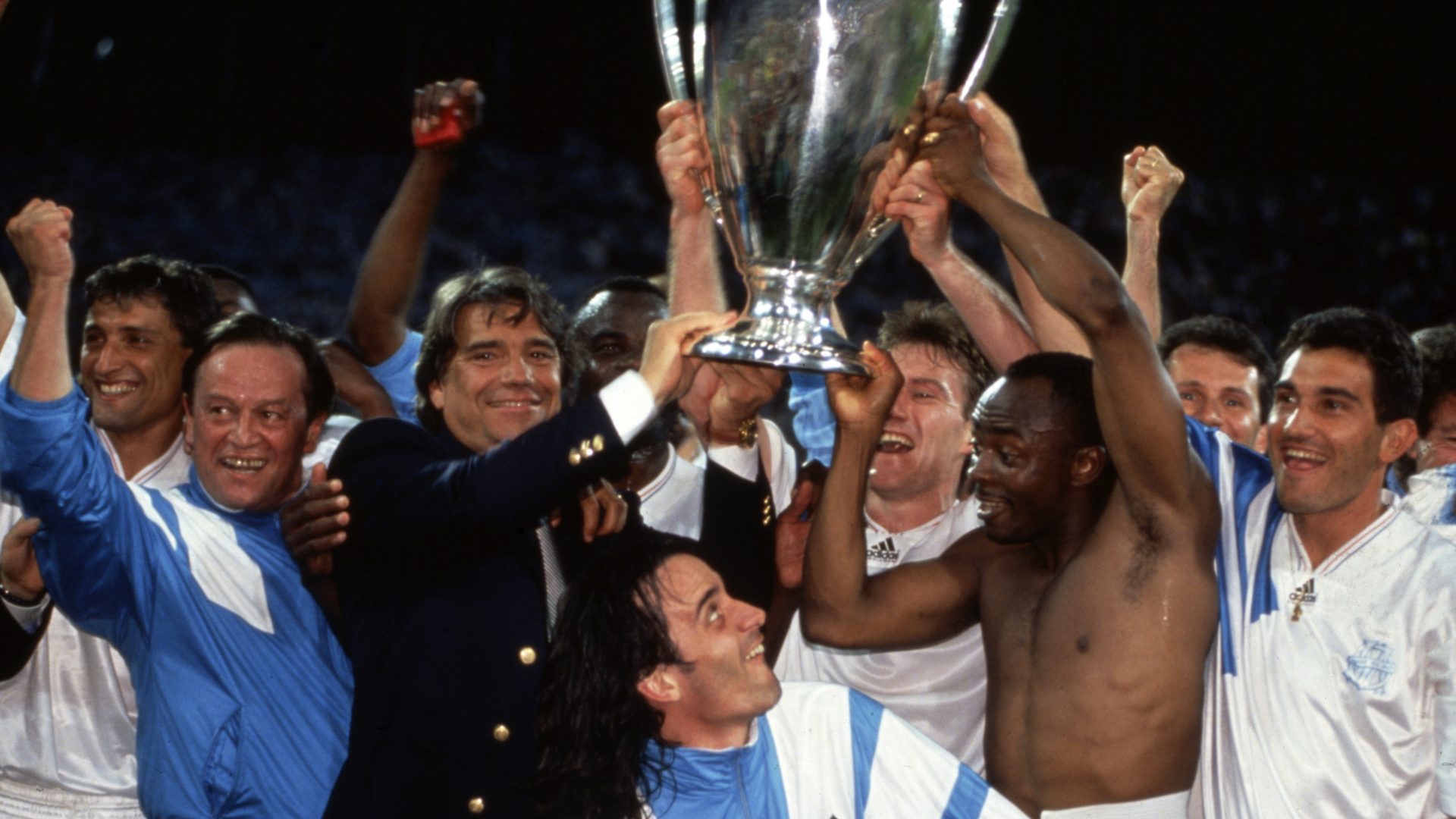And then there he was. Erling Braut Haaland. Blotting out the sun but letting in the light.
He’d been somewhere else for a few years, playing for other clubs, belonging to other fans, onlookers and professional observers, a distant rumour that in the few months before he signed for Manchester City became more than a rumour. Beating drums started to sound nearer, as though caused by his bare running feet as he galloped like a young, carefree god across mythical landscapes on the hunt for rare booty and various kinds of tasty new blood. The 22-year-old Haaland was bursting out of the bold, brash yellow of Borussia Dortmund and slipping into the cool sky blue of Manchester City, and an altogether different experience.
Excitement built, conversations quickly starting about whether he’d fit City’s abstract, abrasively delicate style, if he was a temporary mercenary signing soon to switch to a more established European team, with, so it was said, a real pure-as-snow legacy, a proper, genuinely legendary place in the world. He was passing through, maybe as a favour to his ex-City player dad, maybe for a quick pit stop, some joyous adulation, an absurd top-up of Premier League millions and then on to his real, long-term home.
He was so young that a rampaging year or two at City would still mean a good decade at his ultimate super-destination. City would just be one of those early teams he efficiently passed through, modelling the latest strip, boosting his numbers, crashing various parties, before responsibly settling down and assuming more mature history-changing godlike duties. But for now – and what now! – he was coming to Manchester, and to some of the world’s best players, there, more or less, to serve him, and show him wonderful new routes to goal, so he could serve them.
And then there he was in City’s first match of the season that is never really a match, the Community Shield, playing Liverpool, back in September 2022. It was played in Leicester instead of Wembley for dreary scheduling reasons, and Haaland didn’t seem to fit in this non-game in a prosaic ground not built for gods or living legends. He didn’t score, and famously missed an easy chance as if he was after all not all that, condemned to be stumped by the different, murkier demands of the Premier League.
During the match he would abruptly charge off in different directions towards unknown destinations, chasing through-passes that never came from a team trained to never squander the ball so rashly, not when there was a pass that could be made that could lead to 30 or so more passes that often squeezed the life out of their opponents. As 30 passes became 40, Haaland raced off towards some imaginary target, and scratched his golden blond head as his effervescent dash for glory was completely, almost deliberately ignored.
His random, slightly unhinged contribution to City’s eventual defeat played into the hands of those who saw him as old-fashioned blundering plodder, some kind of gurning, headbanging troll dropped into the patient, kaleidoscopic elegance carefully conceived by City’s head coach, Pep Guardiola.
Pep the prophet was more an avant-garde theorist playing with space, time and beyond than a conventional football manager marshalling the skills of players who did one main thing very well. Pep the strategic preferred players who did one main thing astonishingly, and a hundred other things very well, attackers who defended, defenders who attacked, dreamers who also got stuck in. Haaland was Haaland with his own Haaland purpose, a purpose that would somehow improve or change City enough for them to win the Champions League, the treasure that had eluded Pep the picky’s seven years of calculations and speculations.
Guardiola’s dancing, battling City won the Premier League the previous season with ghosts, shadows and illusions standing in for the traditional, barging one-track-minded centre forward Haaland seemed a retro-kitsch revival of. But the ideological and experimental Pep the perfecto was taking on an anomalous found object that would take some imagination to turn into his kind of player. They tend to be more shape-shifting works of art than efficient but practical tools that work best in short, near-violent bursts of the sort of cracking turbulent energy Guardiola fears, for the way it causes accidents, leads to a perilous loss of control and the most unforgivable thing of all, the creeping black terror of his nightmares, goals given away.
Haaland was operating outside his new team during the Community Shield, not yet able to make a connection between his uncontrollable imagination and a different reality, but then it was too early in the season for Pep and the team to have worked out for themselves a new sense of inside and outside, let alone deal with this new unfathomable possibly unnecessary disruption.
As for me, I was hooked immediately, by the way Haaland moved, the precious look on his tickled pink baby monster face between being blasé and astonished by his own existence. Haaland may not as such have played what might in some reports be called “a good game”, but as I watched at the sluggish edge of pre-season from an unfamiliar stand as he gamely battled with straight-faced opposition players while simultaneously seeming to track his own solitude and make quick decisions that would make sense some other time, I could see that Haaland was something else altogether.
Everything he did was a performance, and this would continue to be true throughout the season, and it wasn’t just the teeming goals shaking up Premier League history. It was also when he spent games at the edge of the action in his own special world, or when he chased stout, bullying defenders trying to rip his flesh and find some kind of off switch. When he caught up with them he would curse their ancestors and break wind in their vicinity as though a spot of haywire argy-bargy was one way he refuels.
I loved it when he wandered around the pitch clapping the fans after a game as though strolling in his garden high on life, hand in hand with Alice in Wonderland. It was always a treat when he played being serious with sing-song sincerity replying with his favourite answers to the same dull questions asked by interviewers awed by being so close to his miracle flesh and super-goofy ways, a very different fun-packed enigma from the solemn, self-important Ronaldo and the elusive, hollow Messi: “I don’t know what to say”; “Good question, I don’t answer that”; “I will do everything I can”. Even his misses were performances, grand, preposterous examples of how he often verges on the edge of wonkiness even as he seems to be following a line of beauty only he knows towards the cosmic.
If he missed, it suddenly seemed strange that this gangly, raging combo of ludicrous limbs, tumbling feet and ridiculous elbows who seems incapable of controlling a ball ever does score. He’s not built for sport, he’s not supersonically inhuman but slapstick clumsy. He admits he yearns to replicate the clean instant touch of one of his City sidekicks, Phil Foden, more than the transcendent passes of Kevin De Bruyne. And then sometime later, perhaps in a few minutes, or in another match, the berserk grace returns, the radiant innocence, the supernatural infallibility.
City have been a constant parade of sensational footballers over the last few years, a handful consistently among the world’s best, guided and enhanced by the devious wisdom of Pep the knowing, but none arrived in the same way Haaland did, as more of a thing, an energy, a destiny. He was pure pulsing fame, and whatever he was as a sportsman, he was also dealing in real time with who he was, and with the international icon he was becoming. Even then, as he hat-tricked baffled neighbours Man United, as he convinced experienced defenders to become clowns in his own private circus, there was never a sense City had become the Haaland Globetrotters. City and their transcendent variety remain the centre of attention, even as he finds himself at the centre of the centre, preparing to score, because he must score.
I’ve seen him score live most of the goals that I now watch many times on YouTube, just to check one more time it all really happened and in my lifetime, which once seemed likely to end with City as a kind of Sunderland or Preston. Some of the goals are apparently achieved as though everyday occurrences, some deep shocks to the system, some otherworldly and audacious, the majority penalty-box happenings with Haaland floating inches above the pitch before crashing down to earth to celebrate.
If you are at a match, seeing him score for real, sometimes a few yards from the action as he changes the world around you in a flash of crazy clarity, your first reaction is to smile, even laugh out loud. Sometimes I notice he’s laughing as well, as if he’s just discovered the meaning of life. Sometimes he seems to laugh at nothing at all or maybe a bee he’s noticed in the corner of his eye or a stray memory of carefree Norwegian youth catching him unawares as he’s chasing a ball. Sometimes he’s trying not to laugh as if he’s realised he must take what he’s doing seriously because it means a lot to the grown-ups around home and indeed any children that happen to be nearby on his wavelength, still able to believe the world is perpetually playtime, a cartoon, a computer game, where you can make a fabulous far-fetched living by being born a wild pain in the neck.
After the Liverpool false start, the muttering began about Haaland being a trophy buy rather than a shrewd harmonic – or subtly dissonant – addition to City’s team of artisans, fixers and explorers.
Even as Haaland the red-blooded and Pep the alchemist worked each other out, the suspicion would increase during the season carried forward by a nagging herd of bluff ex-player pundits, affronted Guardian writers channelling Martin Amis, Roger Angell and John Pilger and Talksport motormouths paid by the provocation looking to outwit or psychoanalyse Pep the anal, to j’accuse City as club and organisation on any number of financial, moral, tactical, legal, intellectual, economical, spiritual and ethical levels.
City were cold, soulless, plastic, their players excessively compensated puppets exploited as sports washing employees by malicious dark side forces. City were cheats. There were 115 grave reasons to prove this. Pep the fraud was nothing special, anyone could do it with his budget. The unfilled Etihad Stadium was a cemetery, their complacent supporters lacked passion and had blood on their hands.
And Haaland the marauding freak of nature with the nutty top-knot was the final outrage, a symbol of all that was arrogant, rotten and artificial about City and their cynical domination of English football that was turning the Premier League into a one-team sporting bore.
(As a mostly wounded, struggling City fan since the damp, second-division 1964, convinced even when there was the progressive Mercer-Allison alliance and occasional blasts of misplaced optimism that we would always exist in the gloomy shadows of United, I have found my own ways of dealing with the dark side, which if you believe is truly the appalling, destructive dark side will only irritate you further. Hint: it’s complicated.)
Eventually, after Christmas, which meant after an out-of-place World Cup that had messed with Pep the mental’s tender mind, the feeling Haaland was lavish folly reached a Jamie Carragher Sky Sports level of open-mouthed know-it-all pomp. Carragher announced during a period when City flirted with near-ordinariness that Haaland, for all his hat tricks and spectacular otherness, had joined the wrong team.
The grumbling herd gleefully, even ominously, started to count his lack of touches in a match, and I was infected by their doubts, even though I was happy watching Haaland as a one-of-a-kind antic being, frantically nattering throughout matches to match officials, opponents, himself, even if he never touched the ball and just careered around the centre circle and waved before and after games to his actually very heated, emotional and self-deprecating City fans.
I’m a City fan always expecting the worst. I started to fret that Haaland looked grumpy and lost and that he agreed with Carragher when he drifted or accelerated inside a force field that seemed to make him invisible to other City players, even to De Bruyne, who at times could sense Haaland’s presence even when he was in one of his other dimensions – like a Belgian timelord who could send the ball into the future, just as Haaland materialised, built for the moment, capable of changing shape in mid-air.
The champions looked to be losing their Premier League title to an Arsenal side featuring two ex-Etihad players bringing with them some of City’s exquisite athletic eloquence. Not even Pep the radical problem-solver could find a way to piece together the merry fury, the molten palaver, the targeted giddiness of Haaland and the disciplined, hard-working spontaneity of City. Then, a Pep the private moment of revelation, and everything was different.
There was some truth that it took a few months of dips and miscues for Pep the quixotic to sort out a flowing relationship between pirate freelancer Haaland and the plan for a perfect City. He had been getting closer to his impossible dream team of 10 rotating midfielders plus a goalkeeper with midfielder vision. To liberate the hyperactive Haaland and guard against any fearful loss of control, four of these midfielders could be centre backs in various forms, all with the bonus of ball-playing ability.
Haaland could be out on his own in his own way, freeing fellow conspirators to revel in open spaces he’d activated without touching the ball. Any lost control might not be the end of the world, it might even lead to a perverse kind of extra control, and he was even learning City-type midfielder skills after a few months of daily contact with Pep the persuader. So, in a way there were two self-contained teams operating in one place, in the way early 1960s Ornette Coleman put together two mind-blowing quartets in one place.
Haaland and nine midfielders, and Ederson the goalkeeper – as original and volatile as Haaland – and simultaneously Haaland as one of the 11 midfielders including Ederson. Together and apart regularly combining in a ravishing celebration of communal interactivity, leading to a tumult of never-in-doubt victories and a third consecutive Premier League title.
The muttering now was that this was the greatest club team of all time, with the darker warnings how they could/should be banned, sanctioned, fined into oblivion, even though Pep the revolutionary’s Manchester City would exist as a ghost however much they were punished. You cannot change this kind of change.
The two rhythms, the two worlds, the separate directions collided and parted, blended and blurred and escaped the obsessive concerns about the problematic owners, the masses of money, the cheating, the clinical tactics, the spoilt, glory-hunting fans, in much the same way Haaland doesn’t seem to worry about any of that, which has to be far from your mind as you score an insane overhead kick, or even as you watch the scoring of an insane overhead kick.
That’s just what it is and what it will be, and as Haaland will say in those interviews where he’s asked the same questions about goals, trebles, hair, records, pyjamas, and inevitably repeats himself with a fleeting look of amusement or boredom, or perhaps folksy Norwegian impatience – “I don’t think about the past or the future. I am just in the moment.”
I’m not pleased he might one day even soon be elsewhere and will miss the outrageous theatre, the wonderfully unsettling performance art. This might be the fantasy of a fan experiencing an unexpected late-life mirroring of his 11-year-old wonder at the City of Colin Bell, Mike Summerbee and Neil Young, but Haaland increasingly seems to fit City, their scrappy, turbulent, underdog history and their recent boosted, triumphant history with Pep the liberator, himself so much more a City freak than when he arrived. Haaland’s slippery, mischievous, “I’m not really here, fuck ’em” personality seems much more new-world City than old-world Real Madrid.
If and when I get my four minutes with Erling Haaland when his fame has gone beyond fame and his entire body vibrates with achievement, I will get to ask him, “Are you for real?” He will answer with the usual nicely done sly, shy grin and the usual, “Well, I don’t know what to say.” His actual answer will come in the next match he plays. With the next goal he scores, cutting open the time and space Pep the greatest valiantly tries to explain to him, just in case.
Because he must score. It is the answer to everything.



